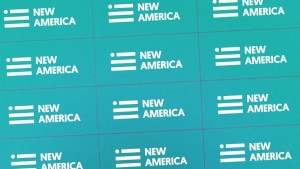Here’s How Google’s Money Really Influences Research
(September 04, 2017), the New York Times reported that the New America Foundation—which over the course of years has received $21 million in funding from Google and its executive chairman, Eric Schmidt—terminated a program run by the prominent antitrust scholar Barry Lynn after he praised the European Commission’s decision to fine Google for abuse of market dominance. Since then, one of Lynn’s associates denounced Google in the Washington Post, New America president and CEO Anne-Marie Slaughter made a reference to “fake news” on Twitter, and the foundation released the entire text of the emails the Times reported on. In the cloistered think-tank world, this is the intellectual equivalent of a cage match.
It’s good to see that Google’s massive donations to think tanks, universities, and other groups are finally getting attention–just last month the Wall Street Journal ran a blockbuster story on Google’s influence in academia. But focusing on the specifics of what happened at New America–whether or not Google explicitly asked the organization to terminate Lynn’s Open Markets program because of what he said, or if that influence was less direct–isn’t an especially good way to understand how Google influences the public policy debate.
Certainly, the specifics don’t make the New America Foundation look good. After his post about the European Commission’s antitrust fine, Lynn says that New America president and CEO Anne-Marie Slaughter told him on a conference call that Google had threatened to cut off the organization’s funding. “She told me that ‘we’ve been in contact with Google and they’re extremely upset,’” Lynn told me. Both New America and Google issued statements saying this didn’t happen. (Lynn’s Open Markets project will continue, outside New America, and it has already launched a website.) But it wouldn’t be the first time Google threw its weight around in the nonprofit world: In 2009, a Google policy executive emailed a foundation to reconsider its funding of an organization that was asking tough questions about Google’s privacy policies, although he later apologized.
Lynn, who had worked for the New America Foundation since 2001, told me that he and the Open Markets program he ran had operated independently until now, with the exception of one previous incident. In June 2016, as it prepared to host a speech by Elizabeth Warren about antitrust issues, “there were efforts by New America to change the tone,” he says. At the time, Slaughter sent him an email saying, “we are in the process of trying to expand our relationship with Google”; it also asked Lynn to “THINK about how you are imperiling funding for others.”
That’s one of the big problems in the think tank world–not what direct pressure Google might have put on New America, but the idea that it might not be able to afford to upset one of its main benefactors. How many scholars decided not to challenge Google not because of a confrontation but out of the desire to avoid one?
The think-tank world has come to be dominated by a distinctly modern kind of doublethink, which combines a rational understanding that corporations spend money to influence public policy with an instinctual belief that some of the institutions that benefit from it–often those that employ the thinker or his friends–function with complete independence. The New America Foundation runs several programs, including the Open Technology Institute , which researches issues that affect Google directly. The scholars who work on those projects don’t think of themselves as Google shills, and it’s hard to believe that they significantly changed their opinions in order to secure think-tank gigs. But it’s also hard to believe that their research isn’t affected by the funding that allows them to do the work they do.
Which leads us to the other big problem in the think-tank world–how the presence of so much corporate money distorts what work gets funded in the first place. In 2008, Schmidt, then chief executive of Google, became New America’s chairman of the board—and marked the occasion with a $1 million donation. (Schmidt was already involved with the organization.) A year later, the foundation officially launched its “Open Technology Initiative,” which did a lot of research that often supported net neutrality and other policy goals Google was lobbying for in Washington. By any measure, the initiative did respectable work on important issues. But without Schmidt’s involvement, would the foundation have even identified these issues as priorities?
Sometimes, the genuinely important work that think tanks do even casts a halo over their worst. On June 28, 2010–at a time when one of Google’s public policy priorities was preventing the passage of stricter copyright laws–the New America Foundation presented a talk by the activist and science fiction novelist Cory Doctorow about “How Copyright Threatens Democracy.” (Doctorow wasn’t formally involved with New America, or Google, but the foundation hosted his speech.) Before Doctorow spoke, foundation program associate James Losey spoke about the importance of an open internet–and compared the way some of that summer’s World Cup games were not available online to Americans without cable television subscriptions to the online censorship of despotic regimes. Most politicians would consider this a fringe view–it’s hard to find a democracy without copyright laws. But the foundation lent some gravitas to Doctorow’s ideas, which happened to serve Google’s interest at the time.
The problem here isn’t that Google is buying scholars–it arguably says something about the company’s tolerance for dissent that it continued to support the organization that backed Lynn for so long. The problem is that Google has donated so much to so many institutions—Stanford’s Center for Internet and Society, Harvard’s Berkman Klein Center for Internet & Society, €4.5 million to set up the Institute for Internet and Society in Berlin–that it can define the terms of important public policy debates. Scholars funded by Google are frequently quoted by journalists on issues that affect the company, often without disclosure of their relationship. The New America Foundation collaborates on the “Future Tense” project for Slate, where thinkers who work for Google-funded institutions sometimes weigh in on important issues.
Perhaps most important, but harder to measure, scholars who are interested in technology issues may simply internalize the fact that they’ll have a much easier time getting funding for projects that won’t make Google look bad. We’ll soon know more about exactly why New America terminated Lynn’s Open Markets program. What we’ll never know is how many similar projects were never be undertaken because institutions that received some funding from Google were reluctant to upset an important donor.
Robert Levine is a journalist who writes about the media and technology businesses, as well as the author of Free Ride: How Digital Parasites Are Destroying the Culture Business, and How the Culture Business Can Fight Back.
Fast Company , Read Full Story
(23)









